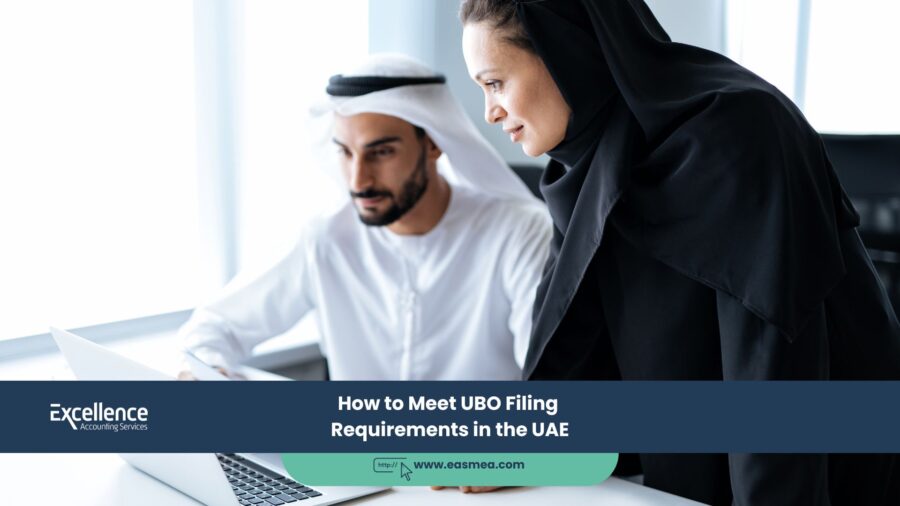The Ultimate Beneficial Owner (UBO) filing is a critical regulatory requirement for businesses operating in the UAE. Introduced to promote transparency and combat financial crimes such as money laundering and tax evasion, UBO regulations are part of the UAE’s broader commitment to aligning with global compliance standards.
- What is Ultimate Beneficial Owner (UBO in UAE)?
- Why is UBO Filing Important?
- UBO Filing Requirements in the UAE
- Steps to Comply with UBO Regulations
- Common Challenges in UBO Filing
- Benefits of UBO Filing Compliance
- How Excellence Accounting Services Can Help
- FAQs About UBO Filing Requirements in the UAE
These requirements compel businesses to disclose their ultimate beneficial owners to relevant authorities, providing clarity on the actual individuals who own or control the company.
Compliance with UBO regulations is not only a legal obligation but also a strategic move to enhance corporate integrity and foster long-term trust with stakeholders. By identifying the true owners of a business, regulatory bodies can ensure accountability, while companies benefit from smoother financial operations and improved reputation.
Failure to comply with these regulations can result in severe consequences, including substantial penalties, operational disruptions, or even the suspension of business licenses. These risks make it imperative for businesses to understand UBO filing requirements fully and take proactive steps to adhere to them.
Key Takeaways:
- Mandatory Requirement: UBO filing is essential for maintaining a valid business license in the UAE.
- Transparency and Trust: Ensures that businesses operate ethically and maintain credibility with stakeholders.
- Avoiding Penalties: Non-compliance can lead to significant fines and business disruptions.
- Expert Support Matters: Leveraging services like Excellence Accounting can simplify the process and ensure full compliance.

What is Ultimate Beneficial Owner (UBO in UAE)?
The Ultimate Beneficial Owner (UBO) in the UAE refers to the individual or individuals who ultimately own or control a company, directly or indirectly, through a chain of ownership or other means. This concept ensures that the actual stakeholders behind a business are disclosed to regulatory authorities. A UBO typically owns at least 25% of the shares or voting rights or exercises control over the entity through other significant means.
UBO regulations are not just about compliance; they are about building trust and ensuring a transparent business environment in the UAE.
UBO filing is a mandatory process for businesses in the UAE and is designed to promote financial transparency, mitigate risks associated with financial crimes, and align with global anti-money laundering (AML) standards. By identifying the UBO, businesses can strengthen trust with partners, financial institutions, and regulatory bodies while avoiding penalties for non-compliance.
Why is UBO Filing Important?
UBO filing is a cornerstone of regulatory compliance and business transparency in the UAE. It ensures that authorities have a clear understanding of the individuals who truly own or control a company, which is essential for combating financial crimes such as money laundering, fraud, and tax evasion. By identifying Ultimate Beneficial Owners, businesses demonstrate their commitment to ethical practices and align with global standards for corporate governance.
This regulatory measure also builds trust with stakeholders—whether they are investors, financial institutions, or partners—by providing assurance of transparency in operations. Furthermore, timely and accurate UBO filing is mandatory for maintaining a valid business license, making it a critical element of legal and operational continuity.
UBO filing is more than a compliance requirement; it is a proactive step toward fostering ethical business practices and strengthening trust in the UAE’s economic framework.
Additionally, UBO filing helps businesses identify and mitigate risks by ensuring they are not inadvertently linked to financial crimes. It also facilitates smoother interactions with banks and other financial institutions, as compliance with UBO regulations is often a prerequisite for opening accounts or securing loans.
| Aspect | Details |
|---|---|
| Regulatory Compliance | Ensures adherence to UAE laws and global AML standards. |
| Transparency | Provides clarity on actual ownership, building trust with stakeholders. |
| Ethical Practices | Demonstrates a company’s commitment to transparent and accountable operations. |
| Legal Continuity | Mandatory for maintaining valid business licenses in the UAE. |
| Financial Transactions | Facilitates smoother interactions with banks and financial institutions. |
| Risk Mitigation | Prevents unintentional associations with financial crimes. |
UBO Filing Requirements in the UAE
Legal Framework for UBO Compliance
The UBO filing requirements in the UAE are governed by the following key decisions:
- Cabinet Decision No. 58 of 2020: This decision laid the foundation for UBO compliance, mandating businesses to disclose their ultimate beneficial owners to enhance transparency and align with international anti-money laundering standards. Key provisions include:
- Identification of UBOs: Individuals holding at least 25% ownership or control.
- Maintenance of UBO Registers: Companies are required to maintain internal registers detailing UBOs and their ownership structures.
- Submission to Authorities: Accurate UBO information must be submitted to the Ministry of Economy or relevant regulatory bodies.
- Ongoing Updates: Any changes in UBO details must be updated within 15 days.
- Cabinet Decision No. 109 of 2023: This decision replaces earlier laws and provides detailed procedures for UBO filing. It streamlines the filing process and emphasizes the importance of accuracy and timeliness in submissions.
- Cabinet Resolution No. 132 of 2023: This resolution specifies penalties for non-compliance with UBO requirements. Fines can range from AED 50,000 to AED 100,000, with repeated violations leading to stricter penalties, including business license suspension.
By adhering to these legal requirements, businesses not only avoid penalties but also demonstrate a commitment to transparency and ethical practices in the UAE’s business environment.
Steps to Comply with UBO Regulations
To comply with UBO regulations in the UAE, businesses must follow these essential steps:
- Identify UBOs: Determine the individuals who qualify as Ultimate Beneficial Owners (UBOs). A UBO typically holds 25% or more of the ownership or control in the company. In cases of indirect ownership, trace the ownership chain to establish the true beneficiaries.
- Prepare Required Documentation: Collect and organize all necessary documents, including:
- Detailed shareholder information.
- Percentage of ownership for each shareholder.
- Official identity documents (passport, Emirates ID).
- Proof of residency and related legal documentation.
- Maintain an Internal UBO Register: Create and regularly update an internal UBO register that includes all relevant information about the UBOs. This register should accurately reflect any changes in ownership or control.
- Submit UBO Information to Authorities: Provide complete and accurate UBO filings to the Ministry of Economy (MOE) or the appropriate regulatory authority. Ensure timely submissions, as delays can result in penalties.
Regular updates and accuracy in UBO filings are not just regulatory requirements but also pivotal in ensuring operational integrity and avoiding legal complications.
By adhering to these steps, businesses can ensure full compliance with UBO regulations, maintaining a strong reputation and avoiding potential fines or operational disruptions.
Common Challenges in UBO Filing
- Inaccurate Data Collection: One of the most common challenges is gathering incomplete or incorrect ownership details. Errors often arise from outdated records, lack of clarity in ownership chains, or miscommunication between departments responsible for compliance.
- Lack of Awareness: Many businesses, especially startups and SMEs, are unaware of UBO obligations or misunderstand their importance. This lack of knowledge can lead to delayed filings, insufficient documentation, or complete non-compliance.
- Failure to Update Registers: Changes in ownership or control often go unrecorded due to inadequate internal procedures. For example, if a shareholder sells their stake or a new owner is added, failing to promptly reflect this in the UBO register can lead to regulatory issues.
- Complex Ownership Structures: Businesses with layered or international ownership structures face additional hurdles. Identifying UBOs in such cases can be a time-consuming and intricate process, requiring detailed investigations and documentation.
- Limited Resources: Smaller businesses may lack the dedicated staff or technology needed to ensure accurate and timely compliance, increasing the risk of errors and delays.
Understanding and addressing these challenges is critical for businesses to navigate UBO requirements effectively and maintain compliance in a fast-evolving regulatory landscape.
Solutions
- Automate Data Collection: Utilize advanced compliance software to streamline the process of gathering and managing ownership data. This reduces the risk of errors and ensures that all required details are captured accurately.
- Regularly Review and Update UBO Registers: Set up a routine process for auditing and updating UBO records. Ensure that any changes in ownership, control, or key personnel are reflected in the register within the stipulated timeframe.
- Provide Training and Resources: Educate internal teams about the importance of UBO compliance and equip them with the necessary tools and knowledge to manage the process efficiently.
- Engage Professional Services: Partner with experts like Excellence Accounting Services who specialize in UBO filing and compliance. Their tailored solutions ensure that your filings are accurate, timely, and in full alignment with UAE regulations.
“By adopting these solutions, businesses can mitigate compliance risks, streamline operational efficiency, and foster trust with stakeholders and regulatory authorities.”
Benefits of UBO Filing Compliance
UBO filing compliance brings numerous advantages that extend beyond regulatory obligations, benefiting businesses in significant ways:
| Benefit | Description |
| Avoid Penalties | Helps businesses avoid fines, license suspensions, or other legal actions for non-compliance. |
| Enhance Business Reputation | Demonstrates accountability and transparency, fostering trust with stakeholders such as investors, clients, and regulatory bodies. |
| Facilitate Bank Transactions | Ensures smooth dealings with financial institutions, as compliance with UBO regulations is often a prerequisite for opening accounts or securing loans. |
| Strengthen Corporate Governance | Promotes ethical practices by ensuring that ownership structures are clear and compliant with international standards. |
| Risk Mitigation | Prevents unintentional associations with illicit activities like money laundering or fraud. |
| Simplified Audits | Makes financial and regulatory audits more efficient by maintaining well-documented ownership records. |
Compliance with UBO filing is not merely a legal obligation but a strategic move that enhances operational efficiency, mitigates risks, and strengthens corporate integrity.
How Excellence Accounting Services Can Help
Excellence Accounting Services provides a wide range of solutions designed to simplify UBO filing and ensure compliance for businesses in the UAE:
- Comprehensive Documentation Assistance: From preparing accurate UBO registers to ensuring all required documents are complete, their team meticulously handles every detail.
- Compliance Monitoring and Updates: Staying updated with changing regulations is crucial. Excellence Accounting Services ensures that your business remains compliant with the latest UBO requirements, including timely updates to registers and filings.
- Customized Guidance for Complex Ownership Structures: For companies with layered or international ownership, navigating UBO requirements can be particularly challenging. Their experts offer tailored strategies to identify and document UBOs accurately.
- Risk Mitigation and Audit Support: With a focus on reducing risks associated with non-compliance, they provide audit-ready documentation and advice to help businesses avoid penalties.
- Technology-Driven Solutions: Leveraging modern compliance tools, Excellence Accounting Services streamlines UBO filing processes, reducing errors and improving efficiency.
Partnering with Excellence Accounting Services allows businesses to focus on growth while leaving the complexities of UBO compliance in the hands of experienced professionals.
FAQs About UBO Filing Requirements in the UAE
UBO filing is the official process where businesses disclose the identities of individuals who ultimately own or control the company. This practice ensures transparency, accountability, and alignment with UAE regulatory frameworks aimed at combating financial crimes like money laundering and tax evasion.
UBO filing involves providing detailed information about the beneficial owners, including their percentage of ownership, control rights, and identity documents such as passports or Emirates IDs.
By adhering to this process, businesses maintain compliance, enhance stakeholder trust, and mitigate risks associated with regulatory violations.
All UAE businesses, including mainland companies and entities operating in most free zones, must comply with UBO filing requirements. However, certain free zones with independent regulatory frameworks, such as DIFC and ADGM, may have distinct UBO guidelines.
Businesses operating in these jurisdictions should ensure they meet the specific local regulations while aligning with the broader UAE compliance framework. Filing is a mandatory step to maintain operational legality and foster transparency in corporate governance.
Non-compliance with UBO regulations can have severe consequences for businesses in the UAE. These include hefty fines ranging from AED 50,000 to AED 100,000, depending on the severity and frequency of the violations.
In addition to financial penalties, businesses may face the suspension or cancellation of their trade licenses, disrupting operations and causing reputational damage. In extreme cases, legal action may be taken against the company or its management, leading to further complications.
Ensuring timely and accurate compliance with UBO filing requirements is crucial to avoid these significant risks.
Businesses must update their UBO registers immediately after any significant changes in ownership, control, or management occur. This includes changes such as the transfer of shares, the addition of new shareholders, or modifications in the control rights of existing owners.
Additionally, businesses are required to perform a comprehensive review of their UBO registers at least once a year to ensure all details remain accurate and compliant with UAE regulations. Timely updates are critical to avoid penalties and maintain transparency.
No, a nominee shareholder cannot be considered a UBO. The Ultimate Beneficial Owner (UBO) is specifically the individual who has ultimate control or ownership of the company, typically through direct or indirect means, such as holding at least 25% of the ownership or voting rights.
A nominee shareholder is merely acting on behalf of another party and does not exercise real ownership or control. Regulatory authorities focus on identifying the true stakeholders to ensure transparency and compliance with anti-money laundering and corporate governance standards.
To comply with UBO filing requirements, businesses must provide a comprehensive set of documents. These include:
- Shareholder Details: A complete list of shareholders, including their names, contact information, and roles within the company.
- Ownership Percentages: Precise documentation outlining the percentage of ownership held by each shareholder to identify ultimate beneficial owners.
- Identity Proofs: Official identity documents such as passports or Emirates IDs for all UBOs and relevant stakeholders.
- Proof of Residency: Utility bills, tenancy contracts, or other legal documents verifying the residence of UBOs.
- Company Documentation: Certificates of incorporation, trade licenses, or shareholder agreements to validate the company’s structure.
These documents must be accurate and up-to-date to ensure compliance with UAE regulations and to avoid any legal or operational challenges.
While most UBO regulations in the UAE align with the national framework, certain free zones such as DIFC and ADGM have unique filing requirements that may differ from mainland guidelines. These variations may include additional documentation, specific reporting timelines, or enhanced regulatory processes tailored to the free zone’s operational standards.
Businesses must verify the precise requirements applicable to their jurisdiction and ensure compliance accordingly. Engaging with compliance experts or accounting professionals familiar with UAE regulations can help navigate these distinctions effectively and avoid errors.
Ensuring error-free UBO filing requires a structured and proactive approach. Businesses should utilize advanced compliance software to automate data collection, validation, and reporting processes, significantly reducing the chances of human error.
Conducting regular internal audits ensures that UBO records remain accurate and up-to-date, aligning with any changes in ownership or control structures. It is also highly beneficial to provide training for staff responsible for compliance to enhance their understanding of UBO regulations and filing procedures.
Finally, partnering with experienced accounting firms, such as Excellence Accounting Services, can provide expert guidance and tailored solutions to navigate complex ownership structures and regulatory requirements efficiently.
No, UBO filing is not a one-time requirement. Businesses must regularly update their filings to reflect any significant changes in ownership, control, or management.
For example, if a new shareholder acquires 25% or more of the company or an existing owner’s stake changes, these details must be reported promptly to the relevant authorities. Additionally, UAE regulations mandate that companies review and update their UBO registers at least annually to ensure compliance and maintain accurate records.
Regular updates demonstrate a commitment to transparency and help avoid penalties for non-compliance.
Excellence Accounting Services offers end-to-end support, ensuring timely, accurate, and hassle-free compliance for businesses in the UAE. Their team of experts specializes in navigating complex UBO filing requirements, providing tailored solutions for businesses of all sizes and industries.
With a focus on precision and efficiency, they ensure that all necessary documentation is prepared and submitted in accordance with UAE regulations, minimizing the risk of penalties or disruptions.
Additionally, their technology-driven approach streamlines processes, enabling businesses to stay compliant effortlessly while focusing on their core operations.
Don’t risk penalties for non-compliance. Contact Excellence Accounting Services today and streamline your UBO filing process!




